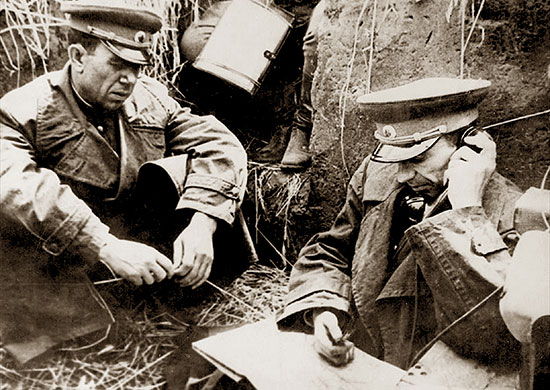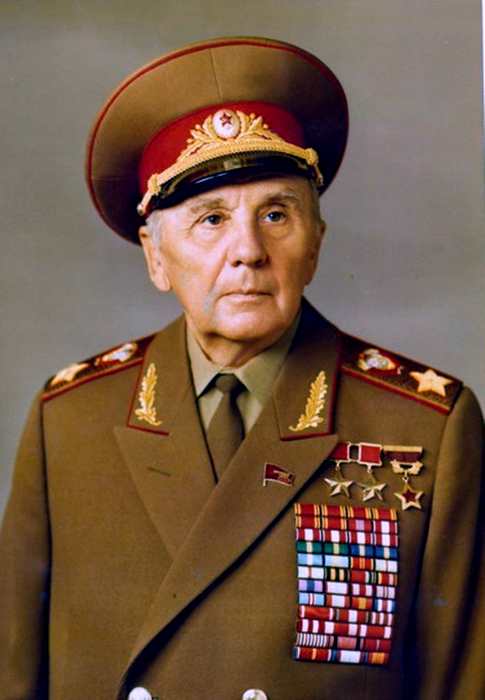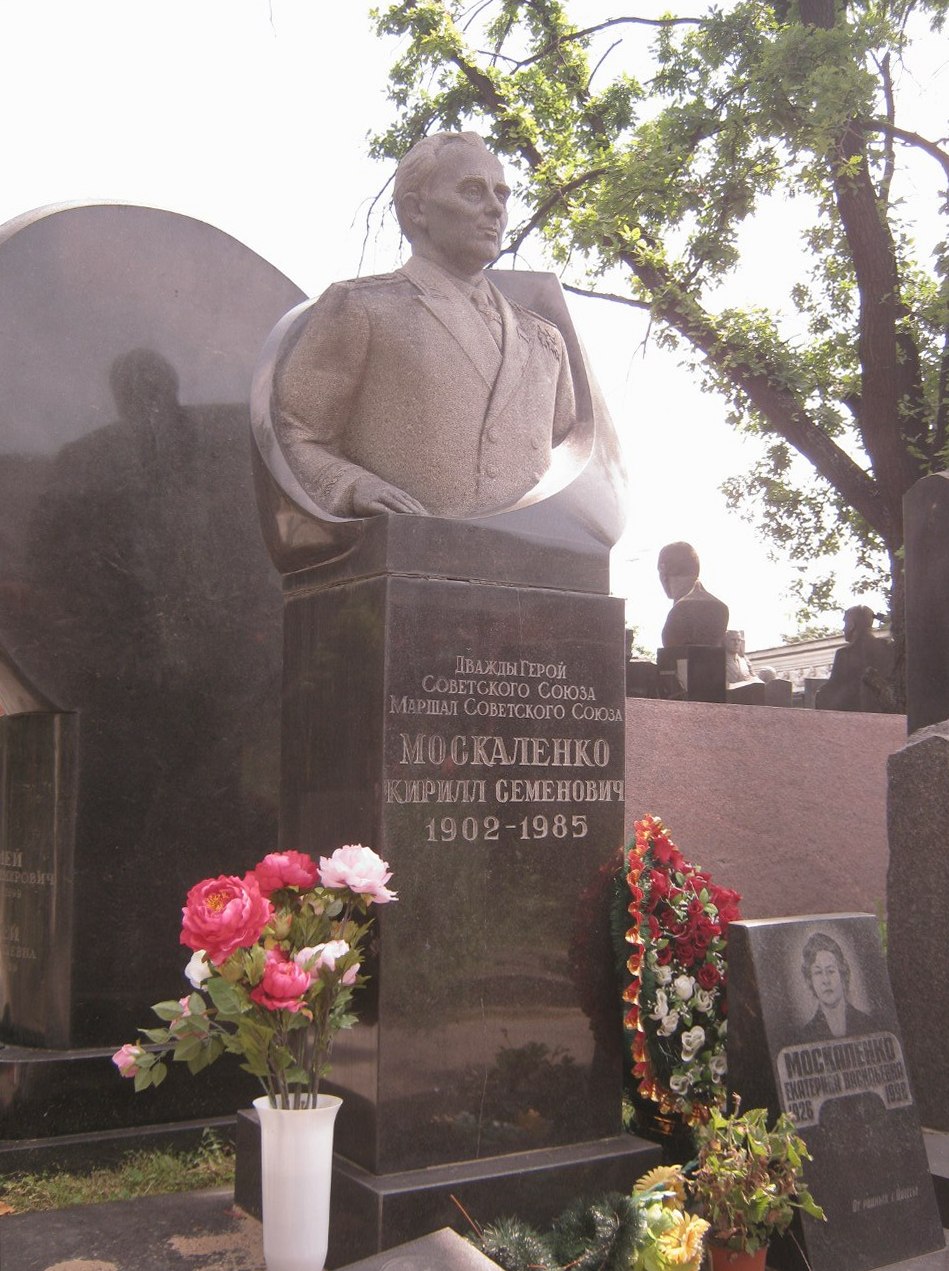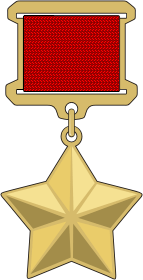1. Overview
Kirill Semyonovich Moskalenko (Кирилл Семёнович МоскаленкоKirill Semyonovich MoskalenkoRussian; Кирило Семенович МоскаленкоKyrylo Semenovych MoskalenkoUkrainian) was a distinguished Marshal of the Soviet Union who played a pivotal role in the Soviet Army throughout the 20th century. Born in the Russian Empire in 1902, his military career spanned the tumultuous periods of the Russian Civil War, the Winter War, and the Great Patriotic War (the Eastern Front of World War II), where he commanded various armies in critical battles such as Kiev, Stalingrad, and Kursk. Post-war, he rose to significant leadership positions, including Commander of the Moscow Military District and Commander-in-Chief of the Strategic Rocket Forces. Moskalenko was also instrumental in the arrest of Lavrentiy Beria after Joseph Stalin's death, an event that significantly influenced his rapid promotion to Marshal. His career, marked by both military achievements and political involvement, concluded with his passing in 1985, leaving behind a complex legacy that includes both high honors and later historical re-evaluations.
2. Early Life and Background
Kirill Semyonovich Moskalenko's early life was shaped by his humble beginnings in the Russian Empire and the revolutionary fervor of the early 20th century, which interrupted his formal education and propelled him into military service.
2.1. Birth and Family
Kirill Semyonovich Moskalenko was born on May 11, 1902, in the village of Grishino, located in the Bakhmutsky Uyezd of the Yekaterinoslav Governorate, Russian Empire. This area is now part of Pokrovsk Raion, Donetsk Oblast, Ukraine. He was born into a family of Ukrainian peasants.
2.2. Education
Moskalenko's early education included graduating from a four-year primary rural school and two classes of a ministerial school. From 1917 to 1919, he pursued studies at an agricultural school in Bakhmut. However, his studies were cut short due to the outbreak of the Russian Civil War.
Following the Civil War, Moskalenko continued his military education. He attended the Luhansk Artillery School and the 2nd Kharkov Artillery School, graduating from the artillery department of the Kharkov School of Red Officers in 1922. Later, he completed advanced training courses for command personnel at the Red Army Artillery Academy in Leningrad and the faculty of advanced training for higher command personnel at the Felix Dzerzhinsky Military Academy in Moscow Oblast.
3. Military Career
Moskalenko's military career was extensive, beginning with his early involvement in the Red Army during the Russian Civil War and culminating in his rise to the rank of Marshal of the Soviet Union, marked by significant command roles in various conflicts and during the Cold War.
3.1. Russian Civil War and Interwar Period
Upon returning to his native village, Moskalenko worked in the rural revolutionary committee. He went into hiding when General Anton Denikin's Volunteer Army seized the province, fearing execution. After the Red Army occupied the village in August 1920, he joined their ranks and the Komsomol. He served in the First Cavalry Army during the Russian Civil War, fighting against the forces of General Pyotr Wrangel and Ataman Nestor Makhno. During his studies in Kharkov, he participated in battles against gangs in the Don and Donbas regions.
From 1922 to 1932, Moskalenko served in the 6th Cavalry Division and the First Cavalry Army, initially as a platoon commander of the Cavalry Artillery Division. While serving in Armavir, he was involved in operations against political banditry in the North Caucasus. In September 1923, his military unit was transferred to Bryansk. From 1924, he served as a battery commander, later becoming commander of a training battery, an artillery battalion, and from 1928, chief of staff of an artillery regiment.
In 1932, he was appointed chief of staff and commander of a special cavalry division within the Special Red Banner Far Eastern Army near Chita. He became commander of a cavalry regiment in 1934. From 1935, Moskalenko commanded the 23rd Tank Brigade in Primorsky Krai. In 1936, he was assigned to the 45th Mechanized Corps within the Kiev Military District. In 1939, he became chief of artillery for a rifle division, and later for a mechanized corps in Moldova. Just before the outbreak of World War II, he was appointed commander of an anti-tank brigade in Lutsk.
3.2. World War II
Moskalenko held critical leadership roles and made significant contributions during major campaigns and battles on the Eastern Front of World War II, known in the Soviet Union as the Great Patriotic War.
3.2.1. Winter War and Early Eastern Front
During the Soviet-Finnish War (Winter War), Moskalenko served as the commander of artillery for the 51st Rifle Division, for which he was awarded the Order of the Red Banner. He subsequently served as chief of artillery for the 35th Rifle Corps and the 2nd Mechanized Corps in Chișinău and Tiraspol, respectively.
When Operation Barbarossa, the German invasion of the Soviet Union, began in June 1941, Moskalenko was commanding an anti-tank brigade stationed in Lutsk. Between June 1941 and March 1942, he successively commanded the 1st Anti-Tank Brigade, the 15th Rifle Corps, the 6th Army, and later the 6th Cavalry Corps. During this period, he participated in defensive battles in Lutsk, Volodymyr-Volynskyi, Rovno, Torchyn, Novohrad-Volynskyi, and Malyn. Moskalenko also took part in the Kiev Strategic Defensive Operation, fighting near Teterev, Pripyat, the Dnieper, and Desna. During a month of continuous fighting against the main attack direction of Army Group South, his brigade destroyed over 300 enemy tanks. For his military successes, courage, and bravery, he was awarded the Order of Lenin on July 23, 1941.
3.2.2. Major Eastern Front Battles
In December 1941, Moskalenko was appointed deputy commander of the 6th Army of the Southwestern Front and later served as acting commander of the army. The 6th Army under his command participated in the Barvenkovo-Lozovaya offensive, liberating the cities of Izium and Lozova. On February 12, 1942, he was appointed commander of the 6th Cavalry Corps, and from March to July 1942, he commanded the newly reformed 38th Army.

During the Battle of Stalingrad, he commanded the 1st Tank Army from July to August 1942, participating in battles on the distant approaches to Stalingrad. According to Moskalenko, his army attacked the enemy almost continuously for twelve days, stopping the advance of German General Friedrich Paulus's 6th Army towards Stalingrad at Kalach-on-Don and gaining nearly a month for the Soviet forces to organize a deep defense and bring up reserves. In August 1942, he was appointed commander of the 1st Guards Army until October 1942. He then received command of the 40th Army, which was part of the Voronezh Front, a position he held until October 1943.
Moskalenko led his troops during the winter counteroffensive and the pivotal Battle of Kursk. He participated in the Ostrogozhsk-Rossosh offensive, the Third Battle of Kharkov, and the Battle of the Dnieper. For his heroism and courage during the crossing of the Dnieper and securing a bridgehead on its western bank, Moskalenko was awarded the title of Hero of the Soviet Union.
3.2.3. Key Operations and Campaigns
From October 1943 until the end of the war, Moskalenko commanded the 38th Army. He led his troops in the Kiev operation in November 1943, which resulted in the liberation of Kiev. In April 1944, his forces liberated Kamenets-Podolsky, and the 38th Army participated in the Proskurov-Chernivtsi operation. After the Carpathian operation, his army, alongside the 1st Czechoslovak Corps, attacked Slovakia. He then conducted the Jasło-Gorlice operation and contributed to crushing the German Operation Spring Awakening (Frühlingserwachen) in Hungary. Moskalenko's forces concluded the war in Prague during the Prague offensive. For his role in the liberation of Czechoslovakia, he was awarded the title of Hero of the Czechoslovak Republic.
3.2.4. Post-War Campaigns
Moskalenko's command of the 38th Army in the final stages of the war was crucial in driving German forces out of Ukraine, Poland, and Czechoslovakia, contributing significantly to the Soviet victory on the Eastern Front.
3.3. Post-World War II Career
Following World War II, Moskalenko continued to hold significant assignments and leadership positions within the Soviet military structure, adapting to the demands of the Cold War era.
3.3.1. Commander of the Moscow Military District
After the war, Moskalenko commanded the 38th Army, which was transferred to the Carpathian Military District. From August 1948, he served as commander of the Air Defense Forces of the Moscow Region. He served in various capacities in the Moscow Military District before being appointed its Commanding General in 1953, a crucial and high-level post that he held until 1960.
3.3.2. Commander-in-Chief of Strategic Rocket Forces
In October 1960, Moskalenko was appointed Commander-in-Chief of the Strategic Rocket Forces, a position he held until April 1962. This role placed him at the forefront of the Soviet Union's nuclear deterrence, a critical period during the Cold War. He also served as Deputy Minister of Defense during this time. From December 1983, he was part of the Group of Inspectors General of the USSR Ministry of Defense, an honorary post.
4. Political Involvement and Key Events
Moskalenko's career was not limited to military command; he was directly involved in significant political events and power struggles within the Soviet Union, particularly in the post-Stalin era.
4.1. Beria Arrest Incident

On June 26, 1953 (some sources indicate July 25, 1953), following the death of Joseph Stalin, a crucial event unfolded during a joint meeting of the CPSU Presidium and the Cabinet. Nikita Khrushchev, along with Marshals Georgy Zhukov and Kirill Moskalenko, secretly orchestrated the arrest of Lavrentiy Beria, who was then the First Deputy Prime Minister of the USSR and head of the secret police. While Zhukov was unable to carry a weapon into the Kremlin, Moskalenko managed to sneak a gun inside to facilitate Beria's arrest.
For the subsequent six months, Moskalenko, alongside Roman Rudenko, led the investigation into the "Beria Case." In December 1953, the Soviet Supreme Court found Beria guilty after a five-day proceeding. On December 23, Beria was executed by shooting. Another account suggests that Beria was shot by machine gun during a military assault on his residential compound in Moscow. Moskalenko's pivotal role in this event significantly influenced his subsequent career advancements.
5. Marshal of the Soviet Union and Assessment
Moskalenko's attainment of the highest military rank, Marshal of the Soviet Union, was closely linked to his political actions and loyalty. However, his career also faced scrutiny and criticism from high-ranking officials, including Nikita Khrushchev.
5.1. Promotion to Marshal of the Soviet Union
As a direct result of his crucial role in the arrest and investigation of Lavrentiy Beria, Moskalenko, along with five other commanders, was promoted to the rank of Marshal of the Soviet Union on March 11, 1955. This rapid advancement underscored the political significance of his actions. For his services in the development and strengthening of the Armed Forces of the USSR, he was awarded the title Hero of the Soviet Union for the second time on February 21, 1978.
5.2. Khrushchev's Criticism and Dismissal
Despite Moskalenko's rapid promotion and initial favor with Khrushchev, the relationship later soured. In his memoirs, Nikita Khrushchev offered a critical assessment of Moskalenko's character and professional conduct, stating that Moskalenko "could be the best and the worst of men." Khrushchev acknowledged Moskalenko's dedication to the defense of the country and his competence as a soldier but heavily criticized his temperament, describing him as having a "violent temper" and being "mentally unbalanced." Khrushchev noted Moskalenko's notorious abuse of subordinates, frequently using phrases like "You traitor, scoundrel, enemy of the people! You ought to be court-martialled! You ought to be shot!" Khrushchev further claimed that Moskalenko's uncontrollable temper made him a deeply moody man who could be easily manipulated.
Khrushchev also expressed shock at the vehemence with which Moskalenko denounced Marshal Georgy Zhukov in 1957, when Khrushchev decided to dismiss Zhukov. Despite these criticisms, Moskalenko remained in office as Commander-in-Chief of the Strategic Rocket Forces until April 1962, when he was dismissed without any stated reason. He was then assigned to the honorary, largely ceremonial post of Inspector General of the Ministry of Defense, a position of no significant influence. The French journalist Michel Tatu, based in Moscow at the time, speculated that Moskalenko's dismissal might have been related to the Cuban Missile Crisis, stating that "The decision (to install soviet missiles on Cuba) affected him directly as commander in chief of strategic rockets. It is a safe bet that a man anxious to preserve his equipment intact could not have been happy at the prospect of having his most secret weapons shipped with nuclear warheads to a highly exposed site such as Cuba."
6. Death
Kirill Semyonovich Moskalenko died on June 17, 1985, in Moscow, at the age of 83. He was interred at the Novodevichy Cemetery.
7. Honours and Awards
Kirill Semyonovich Moskalenko received an extensive array of Soviet and foreign decorations, medals, and honors throughout his distinguished military career, reflecting his significant contributions to the Soviet Union and its allies.
7.1. Soviet Honours and Awards
| Award | Notes |
|---|---|
Hero of the Soviet Union | Twice awarded ("Gold Star» No. 2002 on October 23, 1943, and "Gold Star» No. 105 on February 21, 1978) |
 Order of Lenin | Seven times (July 22, 1941, October 23, 1943, November 6, 1945, March 7, 1962, May 10, 1972, February 21, 1978, May 10, 1982) |
 Order of the October Revolution | Awarded on February 22, 1968 |
 Order of the Red Banner | Five times (April 7, 1940, August 27, 1943, November 3, 1944, November 15, 1950, January 28, 1954) |
 Order of Suvorov, 1st class | Twice (January 28, 1943, May 23, 1943) |
 Order of Kutuzov, 1st class | Twice (May 29, 1944, August 25, 1944) |
 Order of Bogdan Khmelnitsky, 1st class | Awarded on January 10, 1944 |
 Order of the Patriotic War, 1st class | Awarded on April 6, 1985 |
 Order for Service to the Homeland in the Armed Forces of the USSR, 3rd class | Awarded on April 30, 1975 |
 Medal "For the Defence of Stalingrad" | Awarded in 1942 |
 Medal "For the Liberation of Prague" | Awarded in 1945 |
 Medal "For the Defence of Kiev" | Awarded in 1961 |
 Medal "For the Victory over Germany in the Great Patriotic War 1941-1945" | Awarded in 1945 |
 Jubilee Medal "Twenty Years of Victory in the Great Patriotic War 1941-1945" | Awarded in 1965 |
 Jubilee Medal "Thirty Years of Victory in the Great Patriotic War 1941-1945" | Awarded in 1975 |
 Jubilee Medal "Forty Years of Victory in the Great Patriotic War 1941-1945" | Awarded in 1985 |
 Jubilee Medal "In Commemoration of the 100th Anniversary of the Birth of Vladimir Ilyich Lenin" | Awarded in 1969 |
 Medal "Veteran of the Armed Forces of the USSR" | Awarded in 1976 |
 Medal "For Strengthening of Brotherhood in Arms" | Awarded in 1979 |
 Jubilee Medal "XX Years of the Workers' and Peasants' Red Army" | Awarded in 1938 |
 Jubilee Medal "30 Years of the Soviet Army and Navy" | Awarded in 1948 |
 Jubilee Medal "40 Years of the Armed Forces of the USSR" | Awarded in 1958 |
 Jubilee Medal "50 Years of the Armed Forces of the USSR" | Awarded in 1968 |
 Jubilee Medal "60 Years of the Armed Forces of the USSR" | Awarded in 1978 |
 Medal "In Commemoration of the 1500th Anniversary of Kiev" | Awarded in 1982 |
7.2. Foreign Honours and Awards
| Awarding Country | Award |
|---|---|
| Czechoslovakia | Hero of the Czechoslovak Socialist Republic (1969) |
| Czechoslovakia |  Order of Klement Gottwald |
| Czechoslovakia |  Order of the White Lion, 1st class |
| Czechoslovakia |  Military Order of the White Lion "For Victory", 1st class |
| Czechoslovakia |  War Cross 1939-1945 |
| Czechoslovakia |  Order of Friendship |
| Czechoslovakia |  Military Commemorative Medal |
| Czechoslovakia |  Medal "For Strengthening Friendship in Arms", Golden class |
| Czechoslovakia |  Gold Star of the Czechoslovak Military Order for Liberty |
| Czechoslovakia |  Medal "In Commemoration of the Battle of Dukla Pass" |
| Mongolia |  Order of Sukhbaatar |
| Mongolia |  Medal "50 Years of the Mongolian People's Army" |
| Mongolia | Medal "60 Years of the Mongolian People's Army" |
| Poland |  Knight's Cross of the Order of Polonia Restituta |
| Poland |  Cross of Grunwald, 2nd class |
| Poland |  Brotherhood of Arms Medal |
| Poland |  Medal of Victory and Freedom 1945 |
| Poland |  Medal "For Oder, Neisse and the Baltic" |
| Romania |  Order of Tudor Vladimirescu, 1st class |
| United Kingdom |  Honorary Knight Grand Cross of the Order of the British Empire |
8. Legacy and Commemoration
Moskalenko's lasting impact is reflected in various memorials and public recognitions, though his historical role has also been subject to modern re-evaluations and controversies, particularly in light of decommunization efforts in Ukraine.
8.1. Memorials and Naming
Several places and institutions have been named in honor of Kirill Moskalenko, reflecting his historical recognition within the Soviet Union and some post-Soviet states. The Poltava Military School of Communications was named in his honor. He was also designated an Honorary Citizen of the city of Tiraspol. Streets have been named after him in Pokrovsk, Horlivka, and Vinnytsia. A bronze bust commemorating him stands in Pokrovsk.

8.2. Historical Re-evaluation and Controversy
In recent years, Moskalenko's historical significance and contributions have been subject to re-evaluation, particularly in Ukraine. On May 26, 2023, the Kyiv City Council officially stripped Moskalenko of the title of "Honorary Citizen of the City of Kyiv". This decision was made in accordance with Ukrainian decommunization laws, which aim to remove symbols and names associated with the Soviet communist regime. This action reflects a contemporary perspective that re-examines historical figures through the lens of national identity and human rights, leading to the revocation of honors previously bestowed during the Soviet era.

